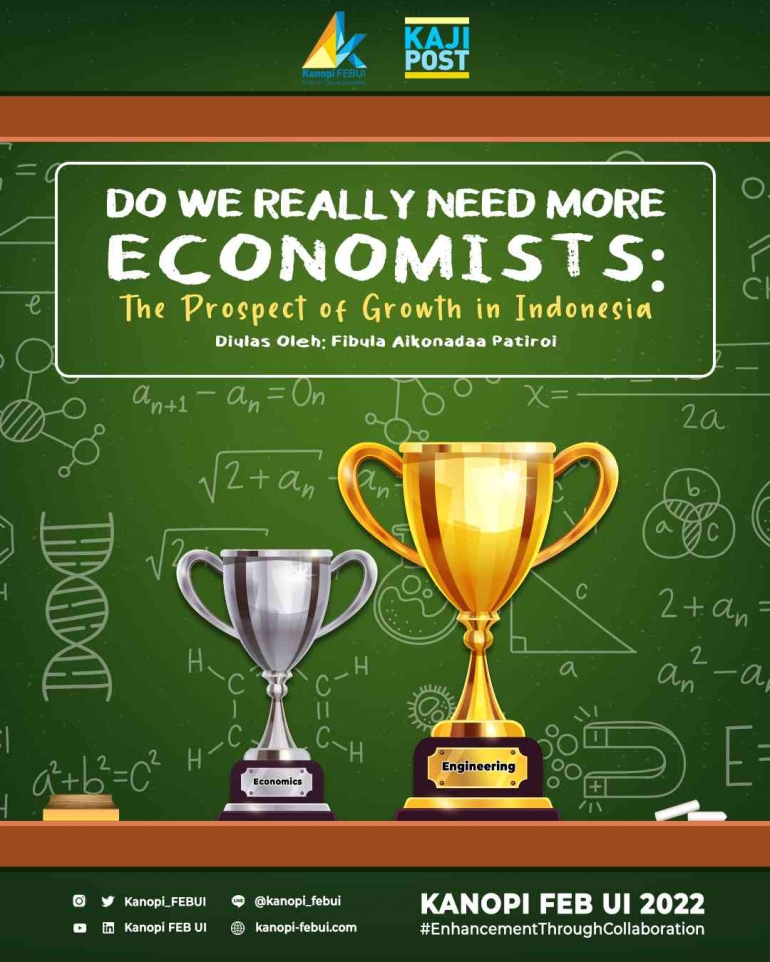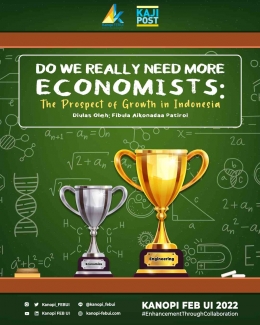"Our future growth relies on competitiveness and innovation, skills, and productivity... and these in turn rely on the education of our people." - Julia Gillard
Every minute of every hour, leaders of most countries have an aspiration for the accelerating expansion in development. Albeit the different ways or strategies they have imposed and discussed within their bodies, institutions believe that one way or another it will lead to the same goal they have in mind to provide their citizens a decent standard of living, or even better, a prosperous one. To acquire this objective, reams of factors need to be considered. Nevertheless, one stands out from most as a poll by the consulting firm Mckinsey itself shows that 84% of executives believes future success depends on innovation, which--in turn--plays an essential role in economic growth (Kylliinen, 2019).
Innovation itself can be interpreted in various different forms. Amongst those varieties, the idea of technological innovation is crucial towards the development of many economies, mainly in underdeveloped countries (Blanksten, 1961).
Although Indonesia's status has been growing as an emerging middle class country, it is one of the countries that are still in need of technological development in various fields and sectors, with the root of the problem itself coming from the lack of labor in its industrial sectors. An important factor that contributes to this is the limitation of the technocrat dream in Indonesia.
Technocracy refers to the model of governance that is chosen based on their technical skills and expertise. This particular idea is limited in the sense that Indonesia believes in a more traditional democracy based on the votes of the mass public, which is opposed to the idea of technocracy, but the traditional democracy in Indonesia still lacks individuals or human labor that understands the STEM field.
That said, it is intriguing enough to wonder how the industrial sector in a country can contribute to the economic development of Indonesia, whilst understanding the important effects of an increase in the labor market of STEM-related job fields.
Indonesia's Strategy to a 4.0 Economy
The primary resolution Indonesia has chosen to shift their focus on increasing the shares of their manufacturing sector is created through the conceptualisation of entering the fourth generation of Industrial Revolution, short for "Making Indonesia 4.0". Through this approach, Airlangga Hartarto, Indonesia's Minister of Industries, presumes that with several programmes the government body carry through, advancement in technology can be achieved (Badan Koordinasi Penanaman Modal, 2019).
These programmes include the concentration of various sectors, including food and beverages (34% to the GDP of the manufacturing sector), textile and clothings (1.30% of the GDP in 2019), automotive (1.76% to the nation's GDP), electronics (exports of $3.75 Billion in 2020), chemical, pharmaceuticals, and also medical devices, which are believed to have the potential in being a consequential determinant to developing the secondary sector of the country respectively (BKPM, 2021).
In spite of that, how are they so sure of that plan when Indonesia itself had not even reached the third Industrial Revolution?
The third Industrial Revolution started near the 1970s until the 20th century, with machines and computers capable of executing what usually is a human's task or job description (Desoutter Tools, 2022). Even though Indonesia faced rapid Industrial growth over the period of 1970-1997--increasing the GDP from 8.9% in 1970 to 24.8% in 1997--this growth was halted by the Asian Economic Crisis, causing a decline in most sectors, especially in the Industrial sector itself (Adam, 2001, p. 154).
The discovery of the root of this issue was found, but surprisingly was not related to the economic crisis Asia was experiencing. Instead, Adam's study (1999) showed that there are multiple flaws to Indonesia's tactics in order to achieve industrialization, including their dependency on international goods and failure of increasing productivity and efficiency in those sectors (Adam, 2001, p. 154). In a way, the failure to increase productivity in these sectors could be related to the workers in Indonesia that do not believe in a pure technocracy.
As such, although the movement and plan of Indonesia's 4.0 strategy needs to be done by the country, what needs to be considered is the fact that Indonesia lacks the tools and labor that can help stimulate innovation in industrial sectors, especially when the labor market of Indonesia lacks engineers that could essentially sustain economic recovery through research and innovation that they can actually initiate.
The Negligence of Industries
With Indonesia being able to face industrial growth in the 1990s and early 2000s, Indonesia was seen as a country that was on track towards industrialization and economic growth. However, as the years go by, Indonesia shifted its focus from their manufacturing sector to services and even agriculture, resulting in the discontinuation of the progress they have already made ages ago. Instead of fixating their development on computers, they concentrated on palm oil as their main source of exports. This in turn resulted in the premature deindustrialization of the developing country itself, ignoring what could have been in terms of maximizing their manufacturing sector.
This all started after the economic crisis the country faced in the year 1998, with Indonesia being more dependent on imports from other countries to substitute the needs for their industries due to the economic crisis. Because of this, Indonesia was no longer able to manufacture the innovations they initially had and quickly shifted back to agriculture, whilst also focusing on their service sectors (Muhammad et al., 2022). This is also constituted by the lack of a government's protection program in terms of policies related to the improvement of their manufacturing sector, being that it does not provide trade protectionism policies similar to countries like China or even the United States.
Knowing that Indonesia itself is a developing country, it can be safely said that Indonesia lacks skilled workers, with only 15.3 million people or 13.3 percent of the total workforce in Indonesia working in the industry sector, making it capital intensive (Indonesia Investments, 2016). This makes it even more difficult as the demand for the industrial sector labor market is higher than the supply itself as the interest of the people in the country is not directed towards working in the manufacturing sector (Indonesia Investments, 2016).
Moreover, the country itself has a weak purchasing power which causes less demand for manufactured goods (Indonesia Investments, 2016). This, in turn, contributes to the mindset that Indonesia "does not have to produce manufactured goods", meaning that there is no actual need of increasing the labor market in those industries.
Also, given the fact that the global economy is vastly developing and growing, Indonesia believes that it would be harder for them to compete in the international market in terms of manufacturing. The development trajectory of China and Beijing, for instance, has made it more difficult for developing countries to attain those standards (Muhammad et al., 2022). In a way, it felt as if Indonesia needed to learn more from other countries in terms of providing the proper tools to nurture the people's understanding in the technical side, but in a way Indonesia is only fluent in the theoretical side to improve their economy.
Are We in Need of Observers or Initiators?
So, the question every job interviewers ask remains: Do we really need more economists or should we focus on the growing labor market of STEM-related jobs? One of the biggest factors to the slow-paced improvement of the manufacturing sector in Indonesia is the lack of awareness of the government in terms of stimulating industrial firms, based on Lall and Rao (1995). The Government body in Indonesia should be able to learn from the ASEAN-2, that encourages the country to develop and diversify their industrial firms through proper assistance in terms of its finance and also the technical side to it. From that, it is important to acknowledge the lack of promotion and encouragement from the government and from the country itself leads to the need of STEM-related jobs or initiators.
However, it is important to know that "the government of Indonesia pays little attention and indicates a slow response to issues" related to industrial sectors (Adam, 2001). Through this, the understanding that economists or observers of a country that could correspond to the pace of the manufacturing sector is essential as well to the country itself. Although the recognition of a trade-off is absolute, the balance of job markets is an important factor to the development of the country. Together with the preservation of science and technology in manufacturing industries, Indonesia has the ability to bounce back as one of the "Asian Miracles" (Muhammad et al., 2022).
References:
Adam, L. (2001). Indonesia's Industrialization: Strategies, Achievements, and Problems. Ekonomi dan Keuangan Indonesia, 49(2), 153-174.
Badan Koordinasi Penanaman Modal. (2019). Making Indonesia 4.0: Indonesia's strategy to enter the 4th generation of industry revolution. BKPM. https://www.investindonesia.go.id/en/why-invest/indonesia-economic-update/making-indonesia-4.0-indonesias-strategy-to-enter-the-4th-generation-of-ind
BKPM. (2021). The Key Sectors to Back Up Making Indonesia 4.0. Ministry of Investment / BKPM. https://www.bkpm.go.id/en/publication/detail/news/the-key-sectors-to-back-up-making-indonesia-4.0
Blanksten, G. I. (1961). The Aspiration for Economic Development. The Annals of the American Academy of Political and Social Science, 334, 10--19. http://www.jstor.org/stable/1034583
Desoutter Tools. (2022). Industrial Revolution - From industry 1.0 to industry 4.0. Desoutter Industrial Tools - Industrial Pneumatic Tool for Aeronautics & Automotive. https://www.desouttertools.com/industry-4-0/news/503/industrial-revolution-from-industry-1-0-to-industry-4-0
Indonesia Investments. (2016, August 4). Manufacturing industry Indonesia in need of development. Investing in Indonesia | Indonesia Investments. https://www.indonesia-investments.com/news/todays-headlines/manufacturing-industry-indonesia-in-need-of-development/item7070
Kylliinen, J. (2019, April 26). The importance of innovation -- What does it mean for businesses and our society? Viima - Make More Innovation Happen. https://www.viima.com/blog/importance-of-innovation
Muhammad, D., Nirmala, M., Siregar, F., & Tjahjono, J. (2022, July 31). Made in somewhere else: How premature deindustrialization undermines the development of Indonesia and other emerging economies. AMINEF - American Indonesian Exchange Foundation. https://www.aminef.or.id/made_in_somewhere_else_how_premature_deindustrialization_undermines_the_development_of_indonesia_a
Baca konten-konten menarik Kompasiana langsung dari smartphone kamu. Follow channel WhatsApp Kompasiana sekarang di sini: https://whatsapp.com/channel/0029VaYjYaL4Spk7WflFYJ2H








